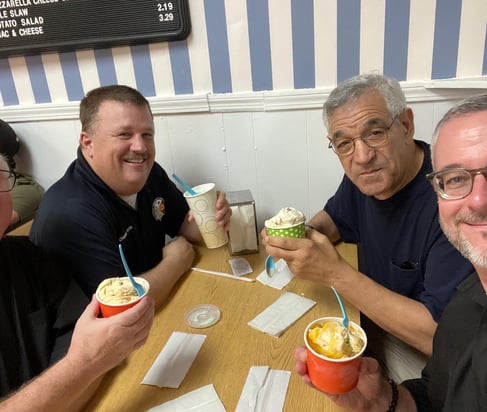A Case for Compassion


A few weeks ago, I sat down with a number of chaplains over some ice cream, and we talked about chaplaincy and compassion fatigue. After discussing our experiences with compassion fatigue, I postulated a theory that I had been mulling around in my head. While society talks about compassion fatigue as something to be avoided, I suggested that as a public safety chaplain, we should be living and ministering just on the edge of compassion fatigue.
We as a society have come to realize that with too much compassion fatigue, we really need to take care of ourselves. But I suggest those chaplains who never feel the wounds of compassion fatigue probably aren't doing their job. As chaplains, it is our job to enter the worst moments of others and walk with them compassionately. We see this time and again with Jesus' ministry. Public safety is all about the public. It's about humanity. Thinking you can do this job without being touched by the human aspects is foolishness.
When compassion is too much (Compassion Fatigue)
The topic of compassion fatigue has undoubtedly made it to the forefront of behavioral health conversations in public safety, and rightfully so. As I tell the recruits at the fire academy, this job will take it out of you. Doing this job will require that you expose your heart to some of the worst things of humanity. They typically have a choice: either let it overwhelm them, grow cynical, or find the middle ground where you take care of the public and yourself.
As chaplains, we love to help people. There can be a lot of intrinsic rewards when we get to help someone through a traumatic event. But working around trauma and grief frequently has the real possibility of sucking the life out of you.
The need for self-compassion
As a public safety chaplain and as a hospital chaplain, I have heard it time and time again, "Chaplain, I am the hardest person on myself." I've heard it from staff, families, and patients alike. And I have heard it from both public safety chaplains and hospital chaplains. As chaplains and first responders, we know others forgive us (insert bad call here). We may even understand that God forgives us (insert God's love here). But we can't get to that point of walking in that forgiveness and accepting that we should forgive ourselves. The devil doesn't need any help accusing us; we do it to ourselves.
When we have no compassion
In public safety, the most common lack of compassion demonstrated would be gallows humor. Gallows' humor mocks and makes fun of the less fortunate (victim, family, bystander, criminal) to relieve our stress from the absurdity of specific calls. I know people defend it as a healthy and innocent way of dealing with the horror we experience, but in practice, it's neither healthy nor innocent. Most of the time, it's done back at the station or in the rig, but occasionally, it's done in front of the public, and first responders get in trouble. They say if you can't say it in front of your mother, you shouldn't do it. If you shouldn't say it in front of your patient or family member, you should say it. It's all about integrity and ethics. Gallows humor is the hardening of the heart to the people around us. It should have no part of the Chaplain's heart. (Guilty as charged!). It makes people less through mockery. As people of faith, we should be taking the part of the lower and lifting people, not dehumanizing them or mocking them in their pain. There should be no room for gallows humor in the chaplain's heart.
Some may say that compassion shouldn't be in public safety. I would say, "What are we, robots?" Compassionate work is exhausting, but compassionate work can be fulfilling. Don't run away or harden your heart. As a chaplain, you are called to do significant, yet at times very difficult, work. You only do your job if you walk the fine line of compassion fatigue. Our job is to minister to humanity, which requires putting your heart out there. But also, don't let compassion fatigue get the best of you. Take the time to take care of yourself.
